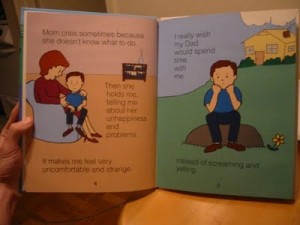Picking up the narrative on the new book from Joseph Nicolosi, Shame and attachment loss: The practical work of reparative therapy, I want to focus on the family dynamics Nicolosi proposes to be at the source of male homosexuality. There are two basic types of family soil which Nicolosi believes grows some same-sex love: the “classic-triadic family” and the “narcissistic family.” If you are looking for the “relatively-normal-often-happy family” in this book, you won’t find it. According to Nicolosi, they don’t produce same-sex attracted men.
In the classic triadic family, the boy “experiences the father as an unsafe/unworthy object of identification,” mothers are “over-involved, intrusive, possessive and controlling,” and the sons are “temperamentally sensitive, timid, passive, introverted, artistic (!), and imaginative.” The result is that the mother and father do not have a good relationship, the father is distant and/or hostile with the son, the son avoids masculine play, the father fails to bring out the son’s masculinity, the mother smothers the boy and robs him of his assertion.
The narcissistic family is worse, it seems to me. The parents are more into themselves than the children. The family is invested in looking good to the world but has many family secrets which must be protected at all costs. I could say more about this family but I will save that for another post. What I want to get to is Nicolosi’s concept of “shared delight.” He says same-sex attracted males didn’t have any of that with their fathers. In a section with the heading, “The ‘Delight-Deprived’ Boy,” Nicolosi expounds on the experiences he says same-sex attracted males missed.
In my search for the particular quality of father-son bonding that is fundamental to the development of the boy’s masculine identity, I have been led to what I call a “shared delight.” I am convinced that the healthy development of masculine identification depends on this phenomenon. This special emotional exchange should be between the boy and his father, although a father figure or grandfather may serve the purpose where no father is available. It is not a single event or one-time occurrence, but should characterize the relationship.
This particular style of emotional attunement is especially important during the critical time of gender identification. Homosexual men rarely if ever recall father-son interaction that includes activities that they both enjoy together. In this vital experience father and son share in the enjoyment (“delight”) in the boy’s success. (p.52).
Nicolosi then declares that homosexual men have great difficulty recalling childhood father-son times which were fun and exciting and which included success for the son. He stacks the deck a bit in favor of his thesis here by saying that gay men infrequently remember being coached by their fathers in an activity that “involves bodily activity or strength.” I say he stacks the deck because he is no doubt aware of research which finds a strong correlation between childhood gender nonconformity and adult homosexuality. While not true of all gay males, many do not remember such activities because neither father nor son liked those activities. And where dad did like them and son did not, it is often a sign of sensitivity that the dad did not force the son to pursue a sport for which the son has no interest or aptitude. An aspect of what Nicolosi defines as “shared delight” sounds like having fun playing sports or active games together.
He then gives an excerpt of Malcolm Muggeridge’s autobiography where he describes going to his father’s office.
When he saw me, his face always lit up, as it had a way of doing, quite suddenly, thereby completely altering his appearance; transforming him from a rather cavernous, shrunken man into someone boyish and ardent. He would leap agilely off his stool, wave gaily to his colleague…and we would make off together. There was always about these excursions an element of being on an illicit spree, which greatly added to their pleasure. They were the most enjoyable episodes in all my childhood. (Wolfe, 2003, p.26).
He then contrasts this depiction of father-son bliss with clinical tales of clients who were not delighted with their fathers.
When I read this section, I was reminded of stories my clients have told me about their fathers over the years. Most of those clients were straight, and many of those stories were sad and empty. People do benefit when they feel approved by their fathers and indeed people with clinical concerns often relate pain from their upbringing. Here again, Nicolosi seems to be oblivious to the fact that his clients are unhappy and experiencing various problems which bring them to counseling. That these men fail to remember happy office visits may not say anything generalizable to all gay men.
Then I also thought of an email exchange I had with a gay man who wanted to understand my positions on various issues related to sexual orientation. The man is well educated and was raised in the Catholic church. He also sought reparative therapy for several years in an effort to reverse his homosexuality. He eventually determined the effort was futile and accepted that he was attracted to the same sex and worked toward a resolution within his faith. I asked him what he remembered about his father and he wrote:
My father was probably one of the most honest men I ever knew. Being Italian, FAMILY was important and he showed his love by making sure that we did things as a family. We ate dinner together always and took many educational vacations. Dad was very handy with his hands and could fix almost anything around the house that “broke.” I often helped him when he needed a “third” hand. He was intelligent and hardworking. When I was young, he tried very hard to get me interested in sports and other traditionally “masculine” activities, etc., but I just wasn’t interested. So…what I was able to give him — something that he also valued — was being good in my studies, ultimately obtaining my Ph.D. He was very proud of me. When my mother was so rigid in her religious beliefs that she was not able to accept me as a “gay son,” it was my dear father who told me he loved me and who kept the family together.
Does this sound like a distant father and son? It is clear that this man loves his dad, knows his dad loved him and was proud of him and viewed him as a salient father. If we are to believe adult recollections as Nicolosi does when they come from unhappy men, then what keeps us from believing this man? If the reparative therapist complains that this man is in denial, I will respond that reparative therapist’s clients have been indoctrinated. Or perhaps a more neutral response would be to say that the therapist’s clients are correct and so is my email friend. In which case, perhaps “shared delight” is a feature of the child development of many fortunate boys, gay and straight, but has little, if anything, to do with eventual sexual attractions.
I emphasize attractions here because I do think a poor relationship with father could affect self-control and thus influence a person to gravitate to a more behaviorally promiscuous life, whether gay or straight. I also wonder if some men are so damaged by their fathers that they respond to any kindness and their sexual responses are guided and shaped by their emotional hunger. Although it is possible that father-deprived males compose some important share of the caseload at Nicolosi’s Thomas Aquinas Psychological Services, I do not believe the lion’s share of gay males who are not in therapy would describe their lives this way.
In fact, father-son estrangement is as universal as fathers and sons. Books and movies (note this website with this theme in 25 movies) use this theme constantly as it tugs at the experience of so many men, gay or straight. For a description of this estrangement from a straight male, see this book (I Thought We’d Never Speak Again) and especially the story of Paul Howerton (“There was nothing about his father that Paul wanted to emulate…”).
The next post will address more of the father-son issues raised by Nicolosi’s book and discuss the concerns I have about Christian groups ratifying them uncritically.
Related post:
Shame and Attachment Loss: Going from bad to worse
Also read Fathers, Sons and Homosexuality for a father’s view of the reparative thesis.


